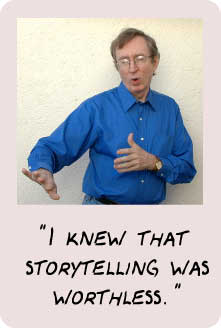|
|
Katalina Groh, Larry Prusak: Some of the world's leading thinkers |
| Storytelling to ignite change: Steve Denning |
 |
A
surprising story to be telling
And the story that I am going
to tell you is a story that I am surprised to be telling you today.
|
| How the Story Began
My story in knowledge began
in February 1996. I had been a manager in the World Bank for several decades.
I had had held some fairly significant positions. In the early 1990s, I
was the director of the Southern Africa Department. In the mid-90s, I became
Director of Africa Region, overseeing around a third of the World Bank
operations.
|
| Books and videos on storytelling *** In Good Company : How Social Capital Makes Organizations Work by Don Cohen, Laurence Prusak (February 2001) Harvard Business School Press *** The Social Life of Information, by John Seely Brown, Paul Duguid (February 2000) Harvard Business School Press *** The Springboard : How Storytelling Ignites Action in Knowledge-Era Organizations by Stephen Denning (October 2000) Butterworth-Heinemann *** The Art of Possibility, a video with Ben and Ros Zander : Groh Publications (February 2001) |
| The views expressed on this website are those of the authors, and not necessarily those of any person or organization |
| Site optimized in 800x600: webmaster CR WEB CONSULTING |
|
|
|
|